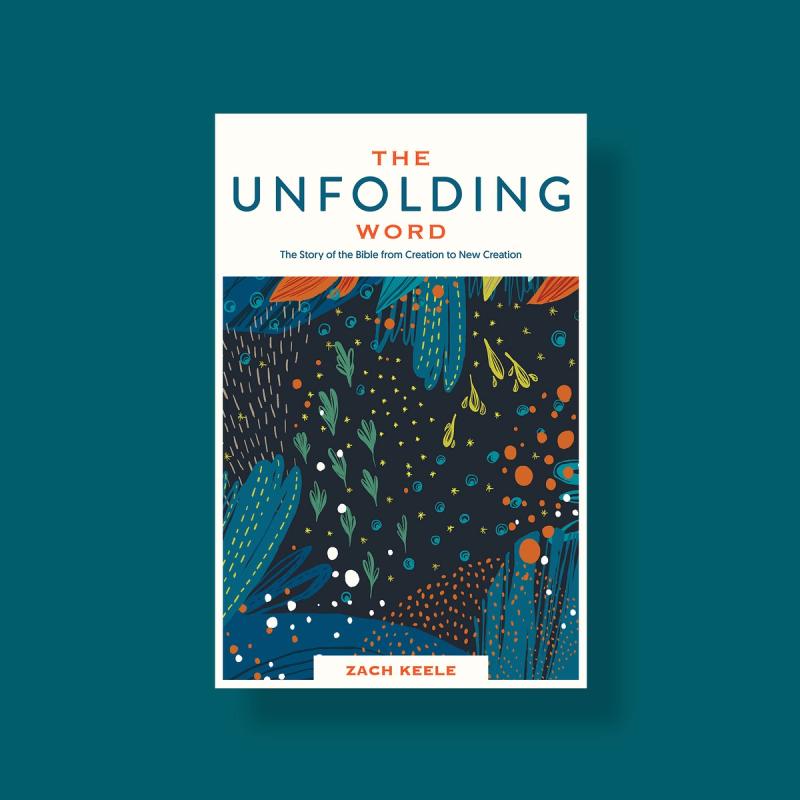A knowledgeable and enthusiastic tour guide makes a big difference to a day of sightseeing. I learned this on a guided tour of Philadelphia historical sites. Our guide was a Ph.D. student in American History and operated a tour business on the side. He took us both to the landmark destinations and those that were lesser known but often equally as important. Combining the knowledge of a trained historian with infectious enthusiasm, he made the city and its historical riches come alive. Our eyes were opened that day to new insights and deeper understanding.
My experience was similar in reading The Unfolding Word: The Story of the Bible from Creation to New Creationby Zach Keele. Keele’s knowledge and enthusiasm accompanies readers through the redemptive story of the Bible. In 13 chapters, The Unfolding Word surveys the Bible as a single story and its component epochs—from Genesis to Revelation—in a way that is both comprehensive and accessible. Readers will gain new insights on familiar stories but will also learn more about lesser known but pivotal events in redemptive history. Keele goes deep but always redirects his readers to the grand narrative of Scripture that finds its fulfillment and fullest meaning in the Person and work of Jesus Christ.
The Unfolding Word clearly benefits from Keele’s years of experience as both pastor of a local church an as an instructor in English Bible survey at the seminary level. His feet are firmly planted in the all-too-often separate worlds of pastoral ministry and rigorous biblical scholarship. Because of this, Keele ably translates high level scholarship for a wider audience. He draws on cutting edge developments in the fields of archaeology and ancient history as well as the expertise of theologians and textual scholars. This is all done with an aim to highlight the authority, accuracy, and the ultimately divine authorship of Scripture. As Keele brings the fruits of scholarly labors to all readers of the Bible, he does so with the heart of a pastor. This combination makes The Unfolding Word a uniquely helpful volume.
The best way to read The Unfolding Word is as an accompaniment to Bible reading. In fact, the book is structured around various recommended groupings of biblical literature. Readers will likely find that reading through the Bible with this book close at hand will keep their motivation high and easily answer common questions as they arise. Even the most experienced Bible reader will learn something new to assist their understanding of God’s Word.
As an excellent guide, Keele helps readers who believe that all Scripture is God-breathed and, thus, useful for faith and life (2 Timothy 3:16) to navigate some of the “tough terrain” of the Bible. The main message of salvation is clear enough from the pages of Scripture that everyone can understand it. But, at the same time, all the teachings in Scripture, in the words of the Westminster Confession of Faith, “are not alike plain in themselves, nor alike clear unto all” (WCF 1.7). Keele anticipates the parts of the Bible that often leave readers scratching their heads or even troubled by what they read. For example, Keele’s section on herem warfare in the conquest of Canaan helpfully explains God’s command of holy war. This “herem,” or total war is, thus, best understood as a picture of the judgment of God on the sinfulness of sin. Likewise, Keele’s introduction to prophetic literature will also be helpful to anyone who has ever gotten bogged down in Jeremiah or Ezekiel during the course of their Bible reading plans. Readers must remember that the Old Testament prophets point beyond themselves and their own day because they “served not only their generation but also those on the other side of Christ’s coming” (148). These insights show that Keele stands in the grand tradition of Reformed biblical theology. Christ is at the center of his approach to biblical interpretation as God fulfills His oft-repeated promise to dwell in the midst of His holy people.
Though this is a wonderful and useful book, one minor change could strengthen The Unfolding Mystery in its usefulness: the addition of more navigational tools. They are not completely absent—there are some helpful charts and headings throughout the book—but there could be more. There are, for example, no Scripture or subject indexes. It would also be helpful to include uniform information in each chapter that would help relate the individual parts to the whole. None of this would require a change in content but, rather, an addition to the layout. As it stands now, it would be somewhat difficult to use this book if, for example, one had a question on specific biblical chapters. The answers are likely there but the addition of navigational helps would improve the book’s usefulness as a reference tool.
This minor quibble aside, The Unfolding Word is commendable for pastors, students, and any reader who wishes to understand the Bible more clearly. It would be a helpful addition to any church library and could easily be used as the basis for a Bible survey class. As skilled tour guides enrich our travel, so this book will enrich readers’ understanding of Scripture. And, unlike a historical tour that has value only for this life, a firm grasp of the God-breathed Word and its unfolding through the history of redemption holds promise for this life and for the life to come.
Andrew Canavan is pastor and church planter at Corona Presbyterian Church, a mission work of the Orthodox Presbyterian Church. He lives in Corona, CA with his wife and three young children.



